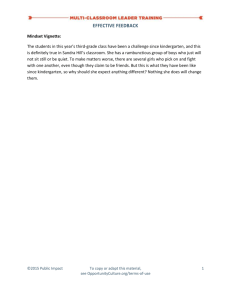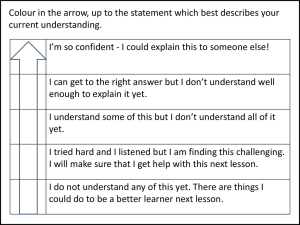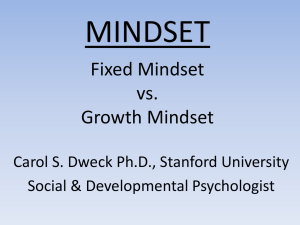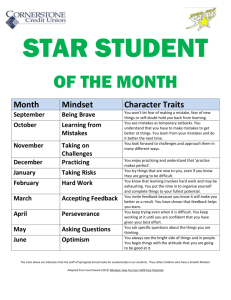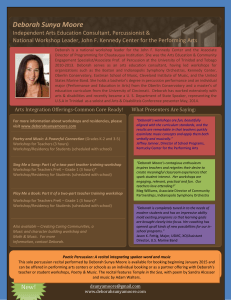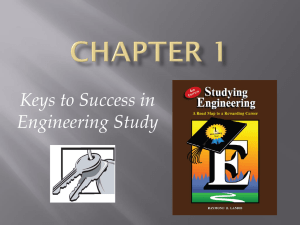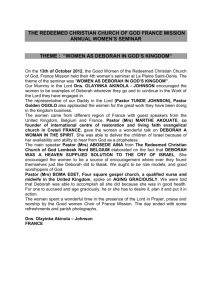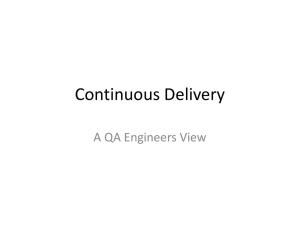Adopting a Creator Mindset
advertisement
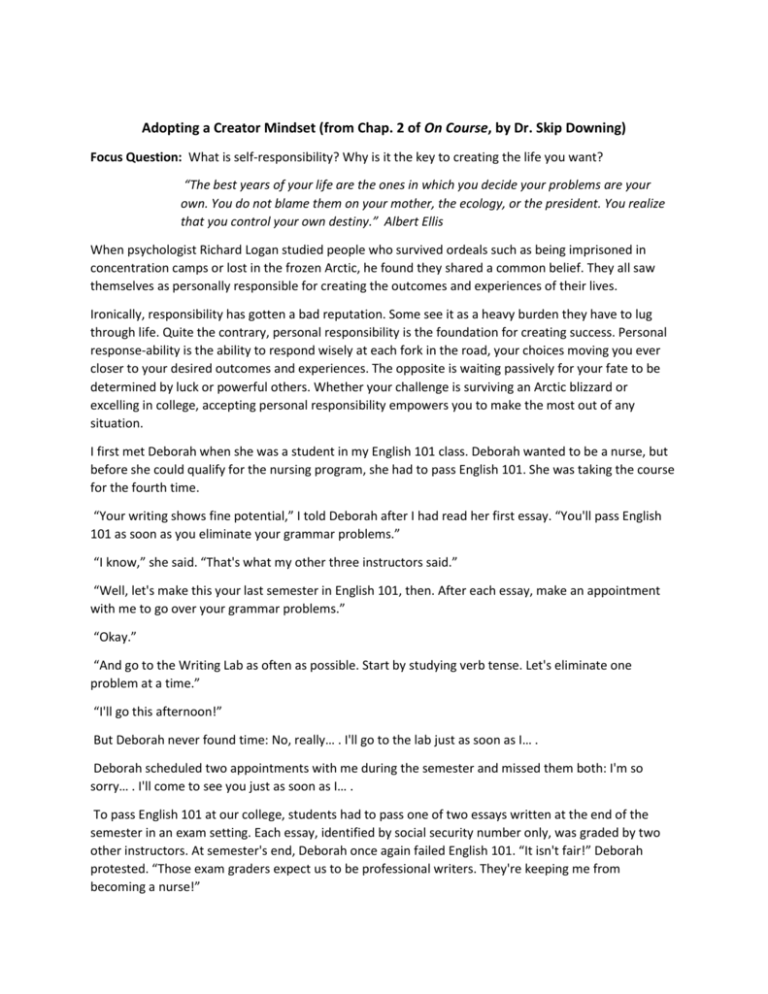
Adopting a Creator Mindset (from Chap. 2 of On Course, by Dr. Skip Downing) Focus Question: What is self-responsibility? Why is it the key to creating the life you want? “The best years of your life are the ones in which you decide your problems are your own. You do not blame them on your mother, the ecology, or the president. You realize that you control your own destiny.” Albert Ellis When psychologist Richard Logan studied people who survived ordeals such as being imprisoned in concentration camps or lost in the frozen Arctic, he found they shared a common belief. They all saw themselves as personally responsible for creating the outcomes and experiences of their lives. Ironically, responsibility has gotten a bad reputation. Some see it as a heavy burden they have to lug through life. Quite the contrary, personal responsibility is the foundation for creating success. Personal response-ability is the ability to respond wisely at each fork in the road, your choices moving you ever closer to your desired outcomes and experiences. The opposite is waiting passively for your fate to be determined by luck or powerful others. Whether your challenge is surviving an Arctic blizzard or excelling in college, accepting personal responsibility empowers you to make the most out of any situation. I first met Deborah when she was a student in my English 101 class. Deborah wanted to be a nurse, but before she could qualify for the nursing program, she had to pass English 101. She was taking the course for the fourth time. “Your writing shows fine potential,” I told Deborah after I had read her first essay. “You'll pass English 101 as soon as you eliminate your grammar problems.” “I know,” she said. “That's what my other three instructors said.” “Well, let's make this your last semester in English 101, then. After each essay, make an appointment with me to go over your grammar problems.” “Okay.” “And go to the Writing Lab as often as possible. Start by studying verb tense. Let's eliminate one problem at a time.” “I'll go this afternoon!” But Deborah never found time: No, really… . I'll go to the lab just as soon as I… . Deborah scheduled two appointments with me during the semester and missed them both: I'm so sorry… . I'll come to see you just as soon as I… . To pass English 101 at our college, students had to pass one of two essays written at the end of the semester in an exam setting. Each essay, identified by social security number only, was graded by two other instructors. At semester's end, Deborah once again failed English 101. “It isn't fair!” Deborah protested. “Those exam graders expect us to be professional writers. They're keeping me from becoming a nurse!” I suggested another possibility: “What if you are the one keeping you from becoming a nurse?” Deborah didn't like that idea. She wanted to believe that her problem was “out there.” Her only obstacle was those exam graders. All her disappointments were their fault. They weren't fair. The test wasn't fair. Life wasn't fair! In the face of this injustice, she was helpless. I reminded Deborah that it was she who had not studied her grammar. It was she who had not come to conferences. It was she who had not accepted personal responsibility for creating her life the way she wanted it. “Yes, but …,” she said. 2-1a Victim and Creator Mindsets. Deborah had a problem that was going to keep her from ever passing English 101. But the problem wasn't the exam graders. The problem was her mindset. A mindset is a collection of beliefs and attitudes. Like a lens, it affects the way you see a situation and influences your resulting choices. A Victim mindset keeps people from seeing and acting on choices that could help them achieve the life they want. A Creator mindset causes people to see multiple options, choose wisely among them, and take effective actions to achieve the life they want. When you accept personal responsibility, you believe that you create everything in your life. This idea doesn't sit well with some people. “Accidents and natural disasters happen,” they say. “There are muggings, murders, and wars. People are marginalized, oppressed, and brutalized simply because they are different. Blaming the victims is unfair. To say these people created the terrible things that happened to them is outrageous.” These observations are, as far as they go, true. At times, we are all affected by forces beyond our control. If a hurricane destroys my house, I am a victim (with a small “v”). In this case I am victimized by a force outside of me. But if I allow that event to ruin my life, I am a Victim (with a capital “V”). In this case I am victimized by a force inside of me. Whether I am victimized from the outside or from the inside is a crucial distinction. When I have a Victim mindset, I become my own oppressor. When I have a Creator mindset, I refuse to be oppressed. Which mistake do you think would be better to make … a. to believe you are in control of your life when you really might not be [or] b. to believe you are not in control of your life when you really might be? Brooks Peterson Civil rights activist Rosa Parks is a perfect example of this distinction. On the evening of December 1, 1955, Parks was returning home on a Montgomery, Alabama, bus. She had just completed a long day as a seamstress in a department store. When the driver ordered her to give up her seat to a white passenger, Parks refused and was arrested. A few days later, outraged at her arrest, African Americans began a boycott of Montgomery buses that ended 381 days later when the law requiring segregation on public buses was finally lifted. As a result of choosing defiance, Parks has been called the “mother of the modern day civil rights movement.” In an interview years later, Parks was asked why she choose to defy the bus driver's order to move. “People always say that I didn't give up my seat because I was tired,” she said, “but that isn't true. I was not tired physically, or no more tired than I usually was at the end of a working day. I was not old, although some people have an image of me as being old then. I was forty-two. No, the only tired I was, was tired of giving in.” In the face of an external oppression, Rosa Parks became an inspiring example of what one person with a Creator mindset can achieve. So, is it outrageous to believe that you create everything in your life? Of course it is. But here's a better question: Would it improve your life to act as if you create all of the outcomes and experiences in your life? Answer “YES!” and watch a Creator mindset improve your life. After all, if you believe that someone or something out there causes all of your problems, then it's up to “them” to change. What a wait that can be! How long, for example, will Deborah have to wait for “those exam graders” to change? “I believe that we are solely responsible for our choices, and we have to accept the consequences of every deed, word, and thought throughout our lifetime.” Elisabeth Kübler-Ross The benefits to students of accepting personal responsibility have been demonstrated in various studies. Researchers Robert Vallerand and Robert Bissonette, for example, asked 1,000 first-year college students to complete a questionnaire about why they were attending school. They used the students' answers to assess whether the students were “Origin-like” or “Pawn-like.” The researchers defined Origin-like students as seeing themselves as the originators of their own behaviors, in other words, Creators. By contrast, Pawn-like students see themselves as mere puppets controlled by others, in other words, Victims. A year later, the researchers returned to find out what had happened to the 1,000 students. They found that significantly more of the Creator-like students were still enrolled in college than the Victim-like students. If you want to succeed in college (and in life), having a Creator mindset gives you a big edge. The more we practice the habit of acting from a position of responsibility, the more effective we become as human beings, and the more successful we become as managers of our lives. Joyce Chapman

